'Godless' writer-director Scott Frank talks 10 of the most stunning shots
Our critic Ken Tucker said it: Godless will make you believe in westerns again. The Netflix limited series was 15 years in the making for writer-director Scott Frank, who — spoiler alert — builds the story to an epic shootout between a gang of outlaws and the women of La Belle, a showdown between the ruthless Frank Griffin (Jeff Daniels) and the redeemed Roy Goode (Jack O’Connell), and Roy’s solo journey to California to reunite with his brother. Along the way, there are shots so gorgeous, Godless may be the most beautiful TV series of the year. Here are the stories behind 10 of our favorite moments.
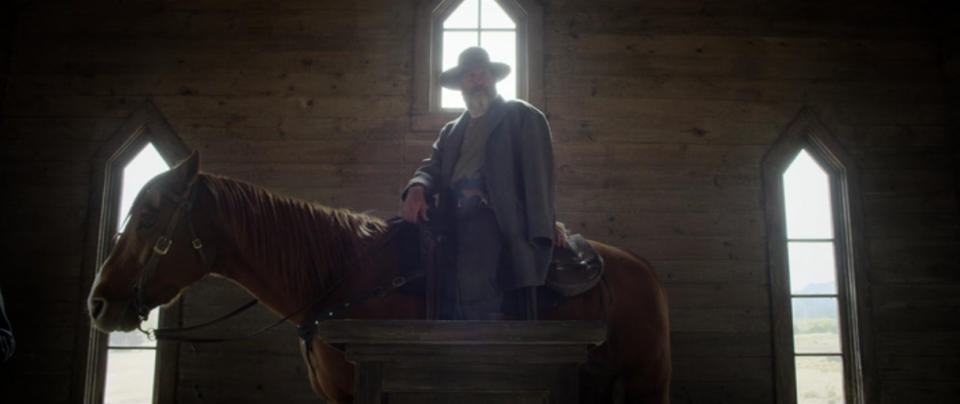
Episode 1: Frank preaches on horseback.
“The challenge is the horse has to hit a mark,” Scott Frank says of Griffin’s perfectly framed warning to a church congregation not to hide Roy should he take refuge in their town. “The other trick is he has to duck and be able to not hit his head as he’s riding into the church, and that’s the actual doorway — we didn’t change anything into the structure. He rode in, and it’s full of people, and there’s a narrow path, and they just kept practicing with the horse. Because the platform he’s standing on is only so big, the horse wouldn’t overshoot the mark or it would be stepping off the platform. The platform was designed to stop the horse from going any further.”
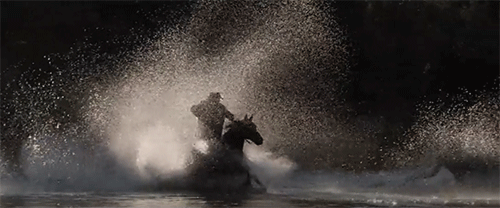
Episode 1: Frank’s gang crosses the Rio Grande.
“We would scout locations and we knew where the sun would be. There are times where we would have to wait for the exact moment. When they’re crossing the Rio Grande and the sun is behind the water when they’re splashing — we knew we had an hour. It was 10:15, and we had to start shooting, and we would only get two or three takes before the sun would move and we’d lose the perfect light,” Frank says. “The other thing there is the depth of the river. The river changes depth depending on how much water they release upstream. So again, it had to be carefully planned so that it wasn’t too deep. The stunt coordinator and the wranglers all rode it before to make sure that the bottom of the river was OK.” Then it was the actors’ turn. “They were all proud of themselves that day,” Frank says.
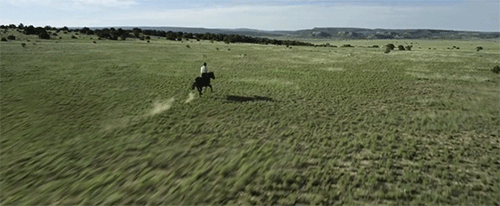
Episode 3: Roy rides out of the ring.
“You want to see this man who feels the most alive and the most free when he’s on horseback — the whole idea is, you don’t know if he’s gonna come back,” Frank says. Three shots make the sequence after Roy breaks a horse for Alice Fletcher (Michelle Dockery): The first is when her son, Truckee (Samuel Marty), opens the gate of the corral. “We’re on the ground as the horse bolts past us. Jack was aboard without any tack — he’s riding without a saddle or bridle or anything, he’s just holding on to the mane, and he’s at a pretty good clip. So we built a temporary corral out of metal fence right outside, so the horse would have to stop,” Frank says. “And on one of the takes, the horse tried to wipe Jack off his back on the fence. Jack saw it coming and just bailed. He took a good fall there.”
For the next shot, chasing after the horse, they used an electric vehicle called a Tomcar. “It goes about 40 miles an hour, and it has a 30-foot arm on it with a stabilized head for the camera, to keep the camera still, and you can move the arm up or down,” Frank says. “It holds four people, so you have your camera operator, the cinematographer, the driver — everybody can be in the car, and the camera’s pretty low to the ground, and we’re pretty close to the horse.”
For the third, soaring shot, they used a drone. “Sometimes it’s windy in New Mexico, and this was July and there’s a lot of storms, and it was very hard to control the camera the first time we did it, so we had to go back and shoot it again,” Frank says. “We mapped it out. We knew the exact route — how far he was gonna ride, where he was gonna start to turn back. You’re not only mapping out the path of the horse, you’re also mapping out the path of the drone and the angle. The camera sort of tilts up as he rides away from us, which is what makes it feel like off he goes. So you go from the ground where we’re tracking him, and then above him, when he’s a tiny little figure below racing across the ground. And then we let him go, and at the top of frame he does a hook and starts to come back, and finally he exits the frame. It’s a lot of work, but also, the music there is spectacular. It’s a big music cue.”
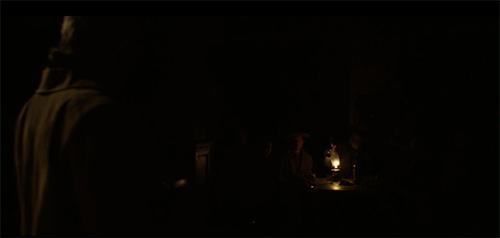
Episode 3: Frank surprises Marshal John Cook (Sam Waterston).
There’s “a little, teeny bit of extra light” added to the shot when Griffin places the glass chimney on the lantern and he and his gang, lying in wait for the marshal, suddenly come into view in the dark saloon, Frank says. But for the most part, that entire sequence is practical: “We knew we wanted the rest of the saloon to fall away into blackness, so that when he walks in, he doesn’t see anybody [but the bartender],” Frank says. “We went into the location and covered all the windows during the day, and we kept testing different lenses on the lanterns so that when you lower the chimney, it does light up the room all around. That’s not an effect. We shot in there without any light. You can do that with digital.”
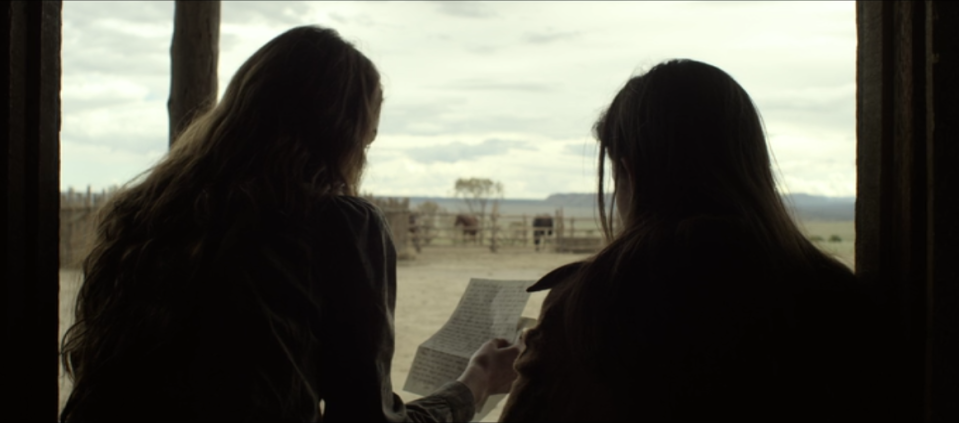
Episode 6: Alice reads the letter from Roy’s brother.
“We built that ranch and we built that house, and this was one of the main shots we were thinking about. I think about The Searchers or other great westerns having the camera in the dark house looking out the door — it’s a classic shot. So we wanted to make sure that we had the horses and then the mountains beyond,” Frank says. “I always knew that for the big dramatic moments, we would be shooting out that door. The bulk of the letter reads on her back, actually, because it’s so powerful with just the two of them sitting there.”
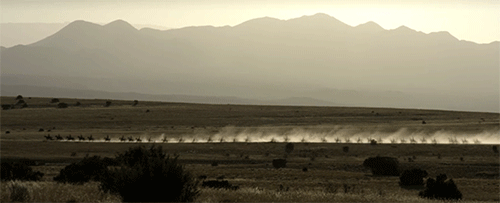
Episode 7: Frank’s gang rides to La Belle, and the dust flies.
“There’s no tricks in that — that’s 40 men on horseback strung out across the frame. The riders are all pros, so getting them spaced out is the easy part. The hard part is the timing — the time of day is really perfect for it, so you just wait for that — and knowing how far away from the men to be to get the exact background,” Frank says. “It was just picking the right spot. For a while they were saying, ‘It would be so much cheaper if we didn’t go back to the actual ranch’ — because they’re really riding by when [Alice] sees them. That ranch we picked because it was such a beautiful location. Everywhere else wasn’t as good, so I just keep saying, ‘It has to be where it actually is, because we picked it for that vista.’”
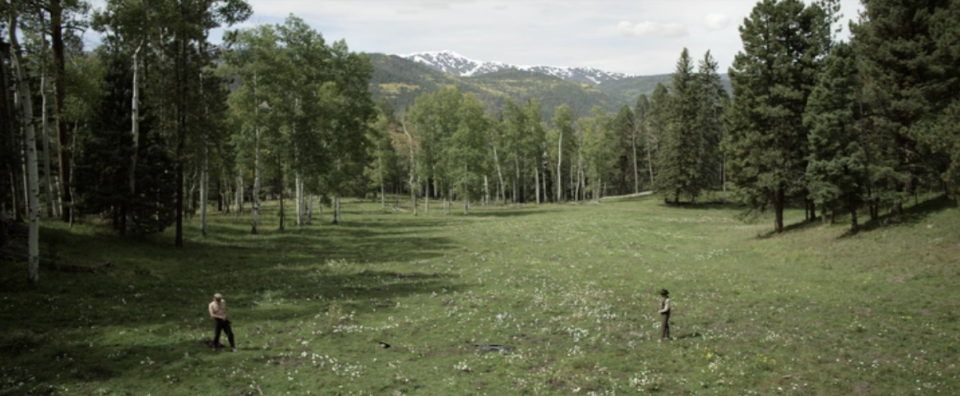
Episode 7: Frank and Roy meet in the meadow.
“Nobody wanted me to shoot there, because you couldn’t drive trucks into that location or you’d ruin the meadow — you had to park some distance away and take these little four-wheel drive Gators into the location,” Frank says of the spot two hours outside Santa Fe. “It was really tricky to get the big crane in for that huge shot — that big, classic, corny shot of the two of them facing each other down in the meadow with all the white flowers and all the white snow on the mountains in the background. But once I saw the location, I couldn’t un-see it. So they were very upset with the production designer for showing it to me, I think.”
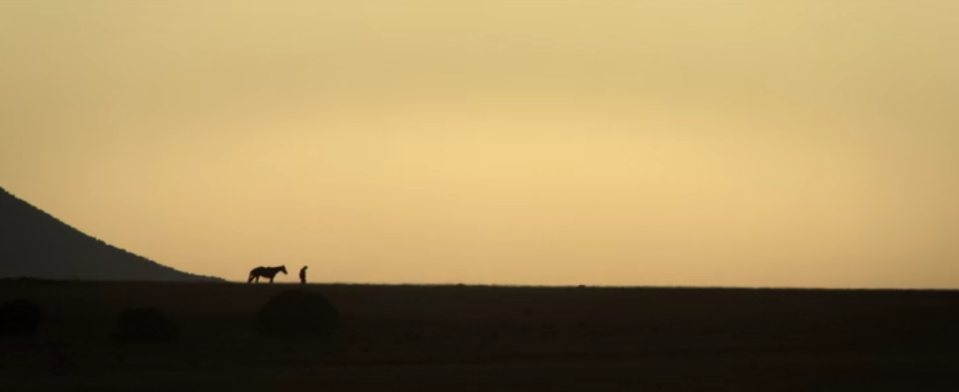
Episode 7: Roy heads West.
“We could’ve had a half-hour sequence of him riding to California,” Frank says. And we would have watched it. He credits second unit director Jeff Dashnaw, a veteran of many westerns (The Magnificent Seven, The Hateful Eight, Django Unchained), with delivering most of the montage — including the sunset shot when Roy dismounts his horse to walk ahead of it for a stretch. “That is a spectacular shot, which they got at the end of one day. They showed me and I just knew. I actually gave that image as a gift to Jeff’s son J.J., who was riding the horse for that,” Frank says.
The series was filmed over five months. “Jeff and I were always on the make for locations, and he was always showing me pictures. Or when we’re scouting other locations, even if we didn’t use them for a scene, we might say, ‘You know what? This’ll be good for the trip to California.’ We’d remember them for later — sometimes we’d shoot them four months later,” he says.
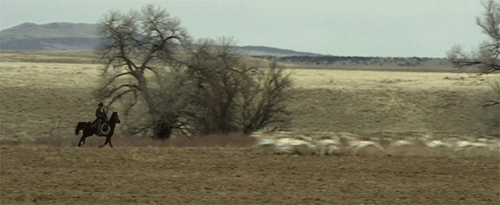
He remembers scouting for the flashback scene in Episode 5, when Frank teaches young Roy how to lay down a horse and they almost get hanged. “It’s a working ranch, and there was a herd of antelope there, and so I said, ‘Let’s bring the second unit crew out and get a shot of Roy riding through the antelope as part of the California montage.’”
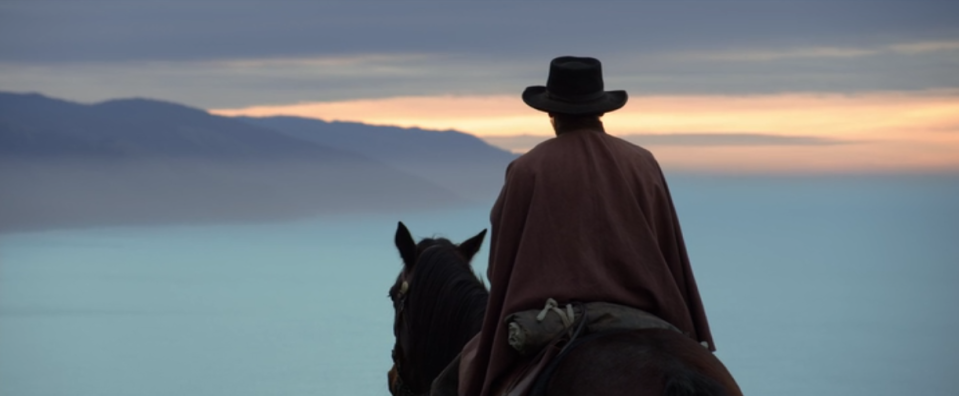
The first unit took over once Roy reached California. The final shot of the series finds Roy looking out at the ocean. It was another location, difficult to access with cranes, that Frank fought for. “We’d been looking forever, and they kept sending me pictures. I always wanted to shoot in Big Sur, and they kept sending me pictures of different places, like in Santa Barbara and Morro Bay, and they were all much easier to get to but they didn’t have the same look. I knew I wanted it to be up high with raw coast in either direction. You had to come out of the mountains and come out of the redwoods. Nothing looked right. He couldn’t be down low or it wouldn’t be very dramatic,” he says.
The crew was on the plane on a Sunday when they heard fog was expected Monday, when they were scheduled to shoot. “Everybody just looked at each other and we said, ‘Let’s go. Let’s just shoot today.’” In the end, they couldn’t get O’Connell ready in time with the aging makeup and beard, but they were able to rehearse the shot with the crane and with the double. “It was enormously complicated: He rides up and the camera comes around from the front of him and goes past him,” Frank says. “The next morning, we could shoot it right away because we had done it 15 times the day before. We got it before all the weather hit.”
Godless is streaming now on Netflix.
Read more from Yahoo Entertainment:

